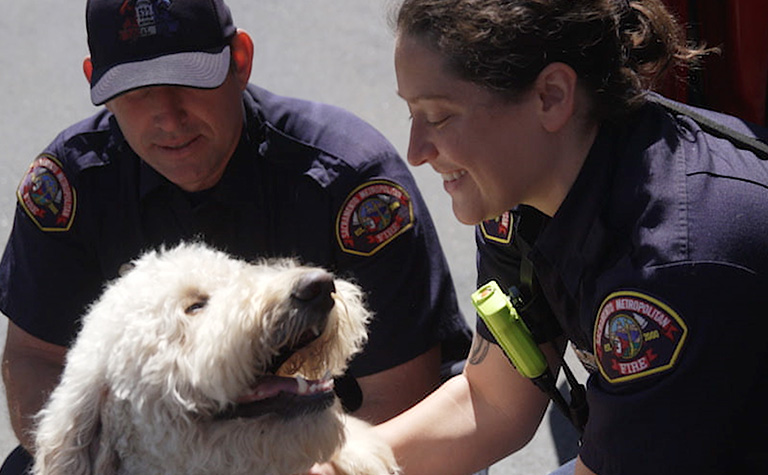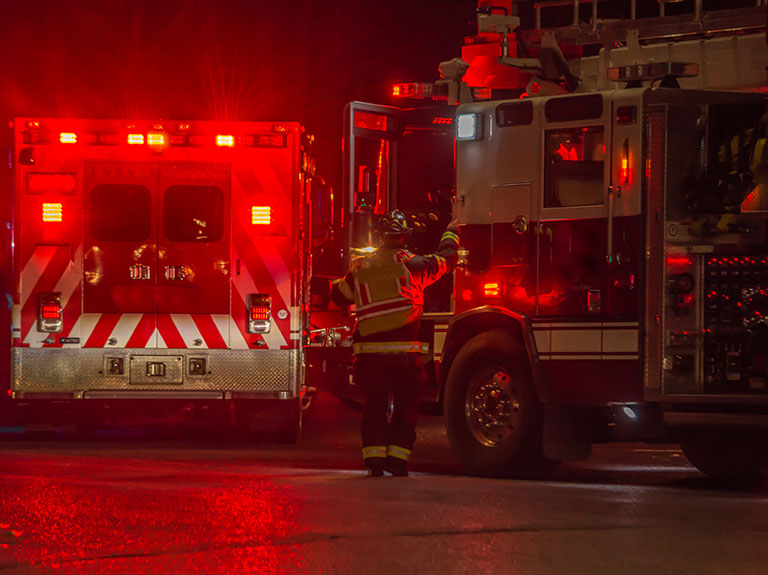Protecting Our Protectors: Supporting First Responders
Download story (PDF)
Español
Protecting Our Protectors
Supporting the Health & Wellness of First Responders
"People don't call 9-1-1 because they're having a good day. And those images, those things you see are going to take a toll on you. And you've got to talk about it."
That’s an excerpt from a first responder’s recent conversation with Kevin Lynch, founder of the Quell Foundation — a nonprofit that works to reduce suicides, overdoses and the incarceration among people who live with a mental condition — as part of the Foundation’s upcoming documentary to further mental health awareness within America’s first responder community.
First responders help and protect us every day. In the process, they go through horrific experiences that can leave deep scars. But all too often, it’s difficult for them to seek help for themselves, which can lead to tragic consequences. Ironically, for a profession that would tell you not to hesitate to call when you need help, they are the last to call when they need it the most. Law enforcement officers and firefighters are more likely to die by suicide than in the line of duty1, and according to Lynch, first responders have the sixth-highest suicide rate by profession in the U.S.
The causes of suicide are complex, but for first responders, contributing factors range from the difficulty of working doctor’s visits into unpredictable work schedules to a culture that too often views reaching out for help as a sign of weakness.
“Many first responders comment about a ‘suck it up, buttercup’ attitude that says you’re supposed to internalize traumas and ignore them as a normal part of the profession,” said Dr. Anna Courie, a former ICU nurse who is responsible for leading FirstNet® initiatives to advance first responder health and wellness at AT&T. “We have to raise awareness and work hard to make that stigma go away, because it’s really a sign of strength to seek help for the problems that face you. When first responders take a stand to get help, they are saying they refuse to be a statistic. They are saying, we are changing the culture of our profession to one that seeks help.”
A big step in that direction was the establishment earlier this year of the FirstNet Health & Wellness Coalition. This effort brings together more than two dozen member organizations that represent more than 1.3 million first responders, and its priorities were developed from the input of over 350 first responders.
John Flynn, an NYPD officer of nearly 35 years, is a Coalition executive board member as part of his work with the National Association of Police Organizations (NAPO), and for him the cause is an extremely personal one. His older brother, a former Las Vegas police officer, took his own life last November. Among other things, Flynn sees training, peer-group support and better communications tools as important parts of the solution.
"In my own department, we gave every police officer up to the police commissioner their own cell phone preloaded with apps to help you do your job. And one of them is a specific app for health and wellness," Flynn said. "You hit that button and all those resources are there. You can use it to anonymously reach out to people who can help. And it includes videos of people who were in their darkest moments and got help. It lets you know that, whatever the situation, someone's been down that road before. You're not alone."
And when emergencies strike, the mental, emotional and physical tolls on responders can significantly increase. That’s why FirstNet launched its “ROG the Dog” animal-assisted therapy initiative. Studies have shown that interacting with animals can improve coping and recovery, enhance morale, decrease stress, and reduce the effects of PTSD and emotional distress.2 Agencies on FirstNet can call upon ROG the Dog to further support the health and well-being of their responders on the frontlines.
“At the heart of the network is people, so if we don’t take care of the people and respond to the most critical challenges facing them, the network and the mission won’t be as effective,” said Courie. “It’s in AT&T’s core values to Be There when people need us, and with FirstNet, that’s exactly what we do.”
Flynn also suggested a way that all of us can help our first responders deal with the stresses they face: "We all have to get back to looking at them as human beings. They're public servants. They protect us. They save our lives. Then they go home and they're just Dad to somebody, or they're just somebody's sweetheart. If we can get society to look at that side of them, then maybe we'll be more willing to reach out and embrace them."

More than 30 FirstNet “ROG the Dog” therapy animals are stationed across the country and have most recently been deployed to support responders following major disasters like the Bootleg Wildfire in Oregon.
Help is Available
If you or someone you know is experiencing thoughts of suicide, any mental health or substance abuse crisis, dial 9-8-8 on your AT&T or FirstNet cell phone to speak with a Lifeline crisis counselor. Americans can also use the Lifeline’s toll-free number, 800-273-TALK (8255), or visit suicidepreventionlifeline.org for more information and resources.
Lift the Mask
The Quell Foundation’s documentary Lift the Mask — First Responders Sound the Alarm will premiere next Friday, Sept. 10, in Arlington, Virginia. This event aims to educate, inspire and empower first responders to recognize mental health crisis warning signs amongst their own.
1Miriam Heyman, et al., “The Ruderman White Paper on Mental Health and Suicide of First Responders,” Ruderman Family Foundation, April 2018.
2Tedeschi, P. and Jenkins, M. (2019). Transforming Trauma: Resilience and Healing through our connections with animals. Purdue University Press.
FirstNet and the FirstNet logo are registered trademarks and service marks of the First Responder Network Authority.
As seen in The New York Times



